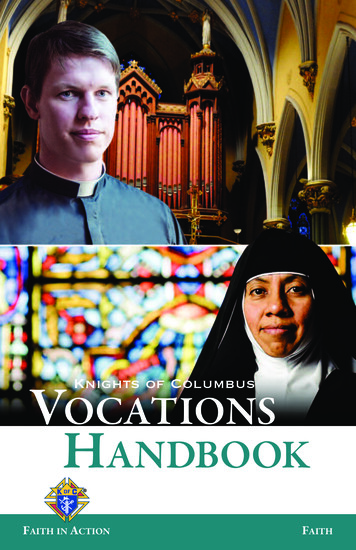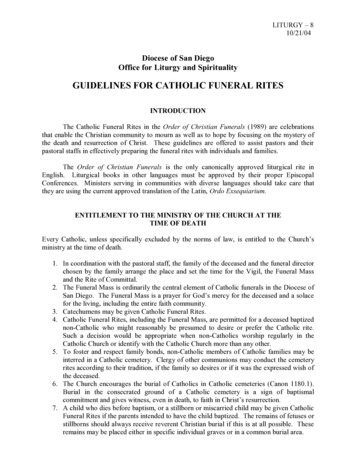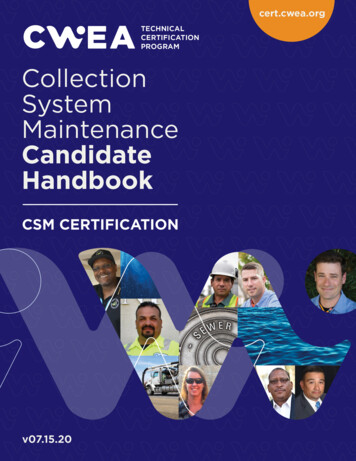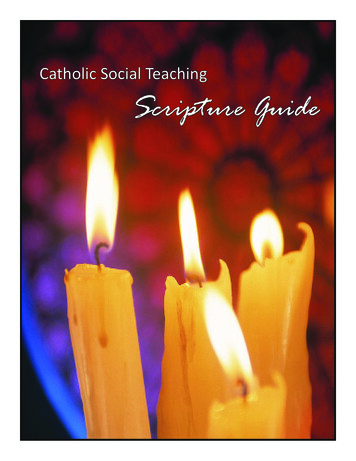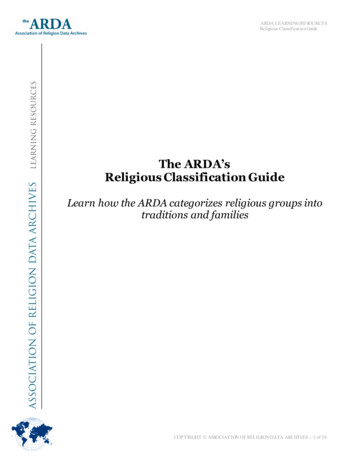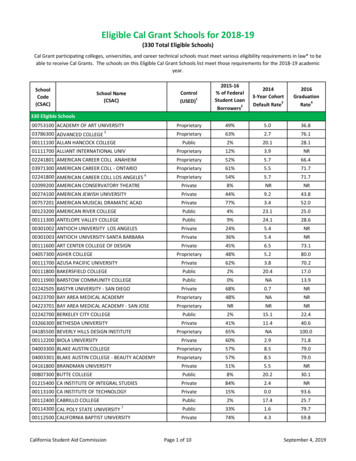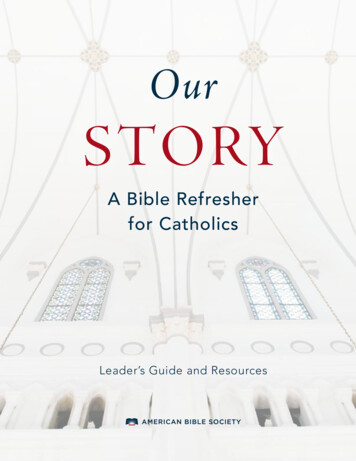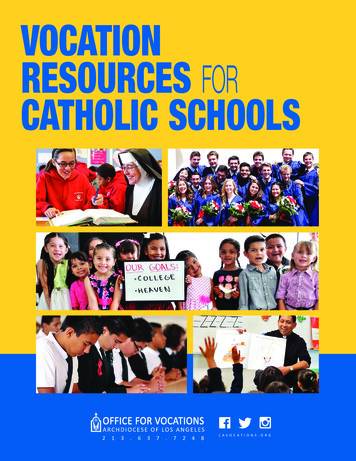
Transcription
VocationResources forCatholic Schools213.637.7248L A V O C AT I O N S . O R G
2Vocation Resources for Catholic Schools
Vocation Resources for Catholic Schools3
Three Simple Goals1. A dopt-a-seminarian: Each classroom will have and display for the coming year a prayer card of theirseminarian and at morning prayers will pray the vocation prayer for him and themselves.2. L etters/Art to their seminarian: As an art or religion class project, the class will send to their seminarianreligious drawings or a letter offering encouragement or asking questions about their call from God.3. V ocation Poster Contest: During Vocation Awareness Week, the school will sponsor a vocation postercontest, on the class and school level, with the winner getting some gift/privilege.Deeper Goals1. T he principal meets with all the faculty and Parish Vocation Director (PVD) to identify possible vocationswithin their school. Those identified are “tapped on the shoulder” and given positions/responsibility withinthe school/parish.2. The principal meets with the faculty and PVD to plan out the year’s vocation activities.3. E ach class schedules a visit with one of their parish priests to see the rectory, the sacristy, have the priestdescribe the various liturgical vessels and clothing, explain the church, its patron, its art, etc.4. On one parent/teacher night, invite the PVD/Vocation Director/Parish Priests to speak to the parents aboutvocations.5. Ensure that an Altar Server Appreciation Day/Luncheon/Dinner/Outing take place.6. Arrange to show the Vocation Offices DVD’s to the various classrooms.4Vocation Resources for Catholic Schools
Questions forSchool Childrento Ask a Priest(These questions can be presented to the children prior to his classroom visitation, so that they as well as thepriest will have some idea of what to talk about.)1. Why did you want to become a priest?2. What is the hardest thing about being a priest?3. What is the best thing about being a priest?4. Why can't women become priests?5. Do you miss not having your own wife and children?6. What do you do all day anyway?7. How long have you been a priest?8. What does it feel like to say mass?9. Who was your favorite priest in your life?10. How did you know that God wanted you to be a priest?Vocation Resources for Catholic Schools5
Promoting ReligiousVocationsTips for Elementary TeachersTips for Secondary TeachersTeachers have responsibility and unique opportunity to guide their students in awareness of God and Hisoverwhelming love for each person. Teachers nurture in youth that personal relationship with the Lord,through which a student will gradually come to hear the Lord’s vocational invitation and be enabled torespond. Teachers and parents create the right conditions - God does the rest!Activities:1. P rovide opportunities for young people to work on service projects with sisters, brothers priests, anddeacons.2. Have students prepare class Eucharists on call/vocations3. Sponsor field trips to religious communities, seminaries, and places of ministries.4. Use bulletin boards, school television, and announcements to stimulate vocation awareness.5. Attend local ordination and vow profession ceremonies.6. Help students to know and recognize the people who have already responded to their religious vocationalcall in their school/parish.7. Make available religious vocation materials in religion study centers, guidance office, and libraries(general information about religious lifestyles and about specific religious communities).8. Explore through Scripture different ways that God calls people and their various responses to that call.9. Invite religious and diocesan personnel to share formally and informally their community life and mission.10. Acquaint students with various types of Church ministries/apostolates.6Vocation Resources for Catholic Schools
11. Promote understanding of religious vocation through reading and projects about founders andfoundresses of religious congregations.12. Celebrate National/Diocesan Vocation Awareness Week.13. Invite faculty to share their personal vocation story.14. Encourage students through a class project to seek vocation materials from various religiouscommunities to share with classmates.15. Encourage students to pray that they might discover and use the gifts that God has given them.16. Help students to affirm and celebrate priests and religious currently ministering in the school/ area.17. Ask local religious communities and rectories to sponsor a short evening program(e.g., prayer, meal, in-put) for an interested group of students.18. Guide students in the development of a habit of personal prayer for discernment of their vocation.19. Incorporate vocation themes into regular class prayer.20. Sponsor contests with vocation awareness themes (e.g., creative writing, posters, photography).21. Building vocation education into each level of religious curriculum.22. Use audio-visual materials with vocation themes.23. M ake available to students information about vocation events sponsored by dioceses andreligious communities.24. Develop class projects that encourage students’ interaction with sisters, brothers, priests, and deacons.Vocation Resources for Catholic Schools7
VocationsPrimary Grades 1-3Lesson PlanTheme: Come Follow Me!Purpose:1. Students will begin to understand the concepts of discernment and God’s will.2. Students will begin to identify the relationship between discernment and God’s will.3. Students will understand how to apply the process of discernment to their own experiences.Supplies:1. Bible2. Pictures of hidden puzzle with numbers and without numbers. There are three different forms of numbered puzzles: choose the type which is most appropriate for yourstudents3. Crayons for each student.Activity #1:Introduce the Word Discernment:1. Give the children the definition: base your definition on the age of the childrenGrade 1: “Discernment means making choices. When we make choices we have to think about what isbest for us and we have to listen to people who know what is best for us. Who do you think helps us makegood choices?” (Take one or two responses) “Good, we listen to grown ups because they know what isbest for us. God also knows what is best for us, so we also have to think about what God wants for us.”8Vocation Resources for Catholic Schools
Grade 2: “Discernment means thinking before we make important choices. Important choices are calleddecisions. When we make decisions we have to do two things. First, we need to listen to what God says isbest for us. How do we know what God wants?” (Take one or two responses) “Right, God speaks throughpeople we know, like our parents and teachers. Then we need to think about why it feels like the rightchoice even if it is not the most fun choice. God knows what is best for you and wants your life to be great.This is what we call God’s will. By listening to God’s will, we can be the happiest we can be.”Grade 3: “Discernment is how we decide what is best for our lives. There are five important steps:1. Asking (for help to make the right decisions)2. Praying (to God to guide your decisions)3. Listening (to God and to other people)4. Waiting (for help and for God to answer your prayers)5. Doing (after the first four steps, it is time to make the choice to do God's will)”2. Ask: What choices do you have to make each day? How do you make important decisions like what to eatand what to wear everyday? Do you have to listen to your parents? What happens when you don’t listen toyour parents?Activity #2:The Story of Jonah: An example of God’s will1. Tell the story of Jonah (Jonah 1:1 - 3:10).2. Discuss the story: Make sure to discuss the way in which Jonah denied the Lord’s call and tried to run away, but wasrewarded when he followed God’s will. Who is God like in this story? Parent, friend, ruler? What happened when Jonah tried to run away? What happened when he accepted God’s will (what God wanted him to do)? How did he talk to God? How can we talk to God?Activity #3:God’s will in a Picture1. H and each child a hidden puzzle picture without numbers and ask them to write “Me” at the top of thepaper2. T ell the students they can color the picture in any way they wish. (You may want to give them a time limit sothey do not take the entire class coloring the first page.)3. Hand out the pictures with numbers and ask them to write “God and Me” on the top of the page.4. Have the students color the picture according to the numbers. Help them with directions if necessary.5. When the students have finished with both coloring pages, discuss the results.Vocation Resources for Catholic Schools9
Discussion1. Look at the numbered picture, what did you find in the picture?2. Did you find anything in your own picture?3. Which one was easier to make?4. Look at your pictures and think about how each of these pictures is like your life. The picture that did nothave numbers is your life when you do things your way. The picture with the numbers is your life when youdo what God wants you to do. The numbers are God’s will. They give you directions to follow in life. Youcan choose to follow or not to follow these directions, but when we listen to God and do what he wants,our lives make much more sense than if we try to do everything on our own.5. (Hold up two blank puzzles- one with numbers and one without) Take notice of the two pictures beforeyou colored them. The pattern is the exact same. God will take each of you just the way you are andmake something of you, the same way the ice cream cone/ campsite/ duck on the water came from thesame picture as the one you tried to color. It is up to you to discern what God is telling you to do and thento follow His directions. How do we discern what God wants? (By listening to our parents, godparents,older brothers and sisters, and teachers and by going to Church every week with our family and praying.For second and third graders, make sure to mention receiving the sacraments of reconciliation andcommunion.)10Vocation Resources for Catholic Schools
VocationsIntermediate Grades 4-6Lesson PlanTheme: Come Follow Me!Purpose:Students will:1. Understand the meaning of the word discernment.2. Understand how to discern their vocations.3. Develop a plan to discern their vocations.Supplies:1. Catechism of the Catholic Church (CCC #2803-2854)2. Discernment Planning handout (See Resources Page Addendum A)3. List of Resources for Discernment (Visit www.lavocations.org, click on Resources)4. Prayers for Discernment (Search online and choose one to pray at the beginning of each class)5. Fishers of Men Supporting Documents (See Resources Page Addendum B)Activity #1:Defining discernment1. I ntroduce the word discernment: prayerfully thinking about a decision one must make, bringing intoaccount the will of God.2. T eachers: Discuss each part of this definition in detail; use the questions as a guide; use the Catechism toadd more depth to the conversation where possible.Vocation Resources for Catholic Schools11
1. Prayerful:A. How do we pray?1. Formal prayer: prayers established by the Church and saints.2. Spontaneous prayer: prayers made up on the spot with your own words.3. Ask for help from God.4. Read the Bible.5. Listen for response from God.6. Pay attention to the feelings you have when you pray.7. Thanksgiving for the time God has given you in prayer.8. Read something written by or about a saint/pope/priest/sister/brother.B. Where do we pray?1. In Church: before the Mass begins and with the congregation during Mass.2. In School: to yourself or as a class.3. At Home: in the morning as you start your day; at meals with your family; at night before you go to bed.C. Why do we pray?1. God knows us better than we know ourselves: He made us.2. God always wants what is best for us and wants to tell us what that is.3. Praying gives us peace of mind.2. Thinking: actually stopping and thinking, not just acting first and then thinking.A. Decision one must make:1. What are these decisions?2. How often do they arrive?3. What decisions have you made in your life that you should have taken more time to think about?B. Bringing into account:1. What does this mean? How much importance should it have?C. Will of God:1. What does God want me to do?2. When should I do what God wants?3. What does God say about the things I want to do or have done?12Vocation Resources for Catholic Schools
Activity #2:Defining the Steps - Discerning your vocation:A. Prayer:1. Usually asking God to make clear the path He wants you to take.2. Time: take time to allow God to speak to your heart.3. Q uiet: plants grow in silence, so does your vocation; listen in the quiet of your room or some otherplace where you can be alone.4. Ask for the saints to intercede on your behalf; the more people praying for you the better.5. Receive the sacrament of reconciliation often; it gives you more grace each time you go, thus you canhave more vocational clarity.B. Spiritual Mentor: someone who will guide you along your path and answer any questions youmight have; also will be a good example of how to live a vocation. Parents: ask their thoughts on vocations (especially marriage).1. Do they feel like they are doing what God is asking of them?2. What do they want you to do when you grow up?3. Will they help you figure out what God is asking of you?4. How is God a part of their marriage?5. What talents do they see in you? (Make a list) Big brother/sister/close family relative: ask them how they think about God. Priest/Deacon/Religious Sister/Brother:1. What are good prayers for discernment?2. How do I know what God wants?3. What if I think it is God but it is really me?4. What if I don’t think I can do what I think God wants me to do?5. W hat talents do they have that make it possible to do what they do? (Make a list and compare it toyours)C. Education: (Visit www.lavocations.org, click on Resources)1. Learn about the seminary/religious community.2. Learn about saints who have lived different vocations.3. Learn what the Church teaches about living a vocation.4. Learn what it is like to live the life of a religious person (priest/brother/sister).5. Learn that you are not alone: check out vocations websites.Vocation Resources for Catholic Schools13
D. Response:1. The response that we might make is difficult to imagine.2. Many times we don’t know what we are responding to.3. Do what you think is required of the vocation you are feeling. P ray even more H elp people in any way you can F ocus on your studies S tart serving at MassActivity #3:Defining Your Life - Plan your discernment path:A. Handout: Discernment Planning (See Resources Page Addendum A)B. Have the children fill out their plan to discern their vocation for one week.C. Send the worksheets home with the children and have them follow the directions to finish theassignment.Activity #4:Defining the Priesthood - Show “Fishers of Men” DVD (If your school doesn't have one, pleasecontact the Vocations Office)A. Discuss reactions to the video.B. Go over Fishers of Men Questionnaire. (See Resources Page Addendum B)14Vocation Resources for Catholic Schools
VocationsJunior highLesson PlanTheme: Come Follow Me!Purpose:Students will:1. Understand that every person is called to holiness.2. Understand that by doing God’s will, we will have life most abundantly.3. Be able to identify ways in which we can follow God’s will and recognize obstacles to following God’s will.4. Be able to describe the differences between the different vocational paths we can walk and identify saintswho fully lived each of those vocations.Supplies:1. Catechism of the Catholic Church (CCC #1716-1876)2. List of Web Resources and Saints Biographies (optional)3. Know Your Saints and Blesseds Quiz (See Resources Page Addendum C)4. Bibles5. Popular magazines with appropriate content and synopses of popular movies (Movie trailers if available)6. Jeopardy (the game show) layout- set up according to your classroom space(See Resources Page Addendum D)Vocation Resources for Catholic Schools15
Activity #1:Holiness Heroes: Saints on the Web1. Visit Patron Saints Indexa) Catholic Online - Saints and Angelshttp://www.catholic.org, then search for Saintsb) Magnificat List of Saintshttp://www.sanctoral.com/en/saintsc) Official Vatican Website for lists of saints and blesseds.http://www.vatican.va/news services/liturgy/saints/index saintsblesseds en.html2. P oint out the different lifestyles of each of the saints, most importantly the diverse ways in which eachof them lived out their Christian call to holiness (many of them in the face of extreme ridicule - even fromtheir families).3. O ffer a list of Saints Biographies (found on web) for a good selection of diverse saints, or you can includeone or more of your favorite saints.4. Have students fill out the “Know Your Saints and Blessed Quiz”Activity #2:The Call to Holiness in the Catechism (Combine with Activity #3)1. Read through Part 3: Section 1: Ch. 1: Articles 2-8 of the Catechism of the Catholic Church (CCC #17161876).2. D iscuss each section making sure to point out the main points discussed in the “In Brief” sections(located at the end of each Article).3. T his will take a few days to go over completely. Be sure to break up the lecture slightly with otheractivities.Activity #3:Finding the Way:Road Signs and Road Blocks to your Vocation (Combine with Activity #2)1. G od’s words: Read the Bible: If you want to know what God is saying to you, open the Bible and read it. Itis here that we first hear God speak.A. Have students read through the following passages in groups (the number of students per group willdepend on the size of the class- you might only have enough students for each student to have apassage or you might have to16Vocation Resources for Catholic Schools
B. Eliminate some- in any case, make sure you know what each passage says). After reading thesepassages (and the text surrounding them), have the students discuss the meaning of the passage in theirown words. Then have each group share their reflections with the class. Challenge the students to applythe passages to their own lives.1. Genesis 12:1-4a2. Exodus 3:10-123. Exodus 4:1, 10-124. Amos 7:14-155. Isaiah 6:86. Jeremiah 1:4-87. Ezekiel 3:1-48. Kings 109. Luke 6:12-1510. Mark 3:13-1511. Luke 18:15-3012. Luke 9:57-6213. Matthew 16:24-2814. Matthew 22:1-1415. Luke 4:1-1316. Luke 10:38-4217. Luke 12:22-3118. Philippines 1:9-1019. Romans 8:26-31C. As a take home assignment, have the students start reading passages from the Bible each night andreporting back to you their reflections. Have them focus on these two areas:2. T he New Testament tells us what Jesus has to say about the Kingdom of God, the servants of God, what itis to be a servant of God, what that requires, and what is required of every person- The Beatitudes3. I n the Old Testament, read the words of the prophets: These are people who had to figure out God’s willand answer it without Jesus there to lead and teach them. Their response is a real testament to faith inaction.Society’s views and School’s view:A. Society’s views: Direct an open discussion in your classroom around one or more of the followingtopics.1. Magazines and movies: what is the message getting to the youth?2. Games: What do the youth see in their games? What roles do they take on to win in these games?3. W hat do people say when others pray in public? Why? (What do you do when people pray in arestaurant?)4. Does prayer infringe on the rights of other people?Vocation Resources for Catholic Schools17
B. School’s View:1. Have the students look up the mission statement of your school.2. Discuss the mission statement: What does it mean? How does the school intend to fulfill that missionstatement? Is the school following its mission statement? How are they failing their mission statement?3. Ask each student what they can do to help the school achieve its mission.C. Your family:1. How often does your family discuss Church or faith?2. What is the opinion of faith in your family?3. Does your family support the priesthood and religious life?4. What if you were to tell your parents that you are considering entering the seminary or convent?D. Your thoughts and ambitions:1. What do you want to do with your life?2. What priorities do you have set in your life?3. When you look at your life in 10-15 years, what part does the Church have in it?4. Do you consider your happiness when you think about your future?5. How do you measure that happiness?6. What are your stereotypes about people who enter the seminary or convent?7. Are they true statements or faulty generalizations?8. Do you recognize, in the stories of those who have entered the seminary, a similarity with your ownstory? In what ways? (Visit www.lavocations.org, click on real stories/priests)9. Do you have all the facts about the Seminary or Convent?10. W hat would you like to know more about? (Teachers: Use these questions as material for the next dayat class; do what you can to find the answers to their questions or plan for a priest or religious to visitthe class)Activity #4:Vocations Jeopardy: (Should be the final activity for the week)1. B elow are the categories. There are enough for both Jeopardy and Double Jeopardy. Feel free to createyour own questions from the material you teach throughout the week. You might also want to create a“Miscellaneous” category which asks questions from previous lessons throughout the year. Make surethat this activity is fun for all. You can set up in the same basic way as Jeopardy with groups “ringing in”with the answers, or you can have all groups answer all questions on strips of paper, which are handed inafter each question is asked, and award points to those who get it right. The latter of these two formatseliminates the “quick trigger” mentality and allows you to read the full question each time. Church teaching on Virtue Bible stories Vocation Journey Saints Which Vocation.? Popular Prayers18Vocation Resources for Catholic Schools
Vocationshigh SchoolLesson PlanTheme: Come Follow Me!Purpose:1. To help students come to a realization that they have been called by God to undertake a specific andunique mission in their lives.2. F or the students to see in episodes of the Scriptures that the response to God’s invitation is not alwayseasy to accomplish, that there must be some sacrifice.3. T o use these episodes from the Scriptures to help the students recognize the difference between thequestions: “What do I want to do?” versus “What does God want me to do?”Activity:1. Daily Spiritual Journals We all want to be happy. At the end of our lives, we all have a hope that we have made a contribution tothe betterment of the human race. As we grow, we are often asked “What do you want to do when yougrow up?” As children, the answer is often, “I want to be a firefighter or a cop, or a doctor.” These earlyimpressions are often filled with an idealistic impression and a hope to be a hero and save the world.As you hit high school and start to look at college and a career, that idealism starts to be replaced by arealism of college costs, admission tests, and your ability to find success in your chosen career field. The question that we are asked, however, is often reversed from what it should be. If we truly want to behappy, instead of asking the question: “What do I want to do?” the question should be: “What does Godwant me to do?” If God has created each one of us uniquely while we were still in our mother’s womb, Heknows better than we do how we are designed and what will lead us to true happiness. In each story below, there is a tension between what the main character desires to do versus what Goddesires them to do. When they follow their own designs, they are met with frustrations and difficulties.When they follow where God is leading, they are met with success and peace.Vocation Resources for Catholic Schools19
For each day listed, read the assigned episode from Scripture and write a page journal entry in responseto the question asked. Teachers should check to see that the students have completed the journals. (Beaware that this activity is not meant to fill the entire class time and should be supplemented with othermaterial which encourages the discernment process.)Monday: Jonah 1:1 - 3:10, The Story of Jonah In what ways have you struggled to follow how Christ is calling you to follow after Him?Tuesday: Matthew 19:16-22, The Rich Young Man What talents has God given to you that He is asking you to share with the world?Wednesday: Luke 10:38-42, Mary and Martha In what ways have you put the needs of this world before the needs of Christ?Thursday: John 4:4-30, Jesus and the Woman at the Well How have you felt the profound love and forgiveness of Christ in your life?Friday: Acts 10:9-23, Peter’s Vision How has Jesus challenged you to go beyond your area of comfort to follow Him?20Vocation Resources for Catholic Schools
Resources page Addendum ADiscernment Planning for Catholic SchoolsDirections: As with any journey, discerning your vocation requires planning and preparation. So, take thistime to plan out how you will be thinking about and discerning God’s will in your life. Make sure to write downyour goal for the week (e.g. To become more aware of God’s power in my life.). Also, under each day write atleast one way you will be praying for, asking about, learning about, and responding to your vocation. At theend of each day, write a short, one to two paragraph journal entry that describes the thoughts you have aboutyour vocational journey.Goal:1. Pray:2. Ask:3. Learn:4. Respond:End of the Day Reflection: On a separate piece of paper, write down the thoughts you have had today aboutyour vocation and God’s will for your life. Include feelings you may have had while you were praying, thoughtsyou had in response to your conversation with your spiritual mentor, anything that surprised you about thevocation you learned about and the feelings you got as you responded to what God was saying to you. Howhas your relationship with God changed? Any other thoughts?Vocation Resources for Catholic Schools21
Resources page Addendum BFishers of Men Questions1.What images of the priesthood (priest as pastor, priest as servant, etc.) were reflected in the movie?2.Which images most resonated with you?3.Is there an understanding of the priesthood that you have that you did not see reflected in the movie?4.What part of the movie did you most / least agree with or enjoy?5. Do you remember your favorite priest, the one who had the greatest impact on your life? Who was heand what did he do?6. What do you think are the qualities a man should have in order to be a priest? Do you know anyone likethat?22Vocation Resources for Catholic Schools
Resources page Addendum CKnow Your Saints and Blesseds Quiz1. Born to a noble Spanish family, this Saint founded the Mercerdarian Order, a military order of monks whocarried swords and sought to ransom slaves.2. This Italian priest was imprisoned for refusing to swear an oath of allegiance to Napoleon Bonaparte, bravelychoosing to remain loyal to the Pope. He founded the Confraternity of the Precious Blood and his missionsermons to convert Freemasons were so successful, he was nicknamed the "Hammer of the Sectarians".3. Born into wealth and privilege, this native of France left leisure behind and became a priest. This saintfounded the Order of the Most Holy Trinity to secure the release of Christian slaves held by the Muslims.4. The son of a nobleman, this blessed was ordained a Benedictine priest before becoming a professor at theUniversity of Montpelier. After being appointed the abbot of a monastery, he regularly assisted the Pope ondiplomatic journeys. Though neither an Italian, nor a Cardinal, he was surprisingly elected Pope.5. In his early days, this saint was such a skilled metalworker that King Clotaire II hired him to build the "Chairof State." He was later made a bishop. Deeply loved for his charity, honesty and holiness, he continued to dometalworking in his spare time.6. Receiving no education in his childhood in Germany, this shepherd's son started working 12 hours a day in ashoe factory at the age of 18, but began studying at night. He graduated high school at the age of 24 and wasordained a priest at 32. He became the leader of a society of Catholic young men that later was named forhim. In contrast to his contemporary Karl Marx, this blessed stressed the dignity of man and of work.7. Born into an Italian naval family, this brilliant saint began as an attorney before becoming frustrated with courtbattles. He was ordained a priest, wrote prolifically, battled the heresy of Jansenism and lived to the age ofninety.8. This Dominican Priest was one of the greatest artists of the early Renaissance. His paintings of Christ in thesmall cells where his brother monks lived and prayed in Florence, Italy are still visited by thousands of art fanstoday.9. This accomplished British poet and Jesuit Priest was tortured during the reign of Queen Elizabeth I.Convicted of “being a Catholic Priest,” he was hung, drawn and quartered for remaining true to the Churchand his Priestly vocation.10. As a young man, he was taught the Catholic faith by the last living Apostle, St. John. Decades later, as anelderly bishop, he was martyred by the local pagan authorities who first tried to burn him alive, but when theflames did not touch him, slit his throat. The written account of his fearlessness during martyrdom inspiredthousands of the early Christians to faithfully endure persecution.11. As a military chaplain, this French Priest spent 52 straight months at the front during World War I without everbeing wounded. He att
12 Vocation Resources for Catholic Schools 1. prayerful: A. How do we pray? 1. Formal prayer: prayers established by the Church and saints. 2. Spontaneous prayer: prayers made up on the spot with your own words. 3. Ask for help from God. 4. Read the Bible. 5. Listen for response from God. 6. Pay attention to the feelings you have when you pray. 7.
